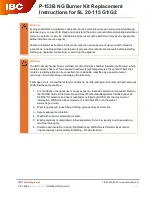
52
Installation & Operation Manual
8
Field wiring
ELECTRICAL SHOCK HAZARD – For
your safety, turn off electrical power supply
before making any electrical connections
to avoid possible electric shock hazard.
Failure to do so can cause severe personal
injury or death.
Wiring must be N.E.C. Class 1.
If original wiring as supplied with boiler
must be replaced, use only type 105°C
wire or equivalent.
Boiler must be electrically grounded as
required by National Electrical Code
ANSI/NFPA 70 – latest edition.
Installation must comply with:
1. National Electrical Code and any other national, state,
provincial, or local codes, or regulations.
2. In Canada, CSA C22.1 Canadian Electrical Code Part 1,
and any local codes.
4. Wire the boiler pump as shown in FIG. 8-2.
5. When connecting a domestic hot water (DHW) pump,
connect the wiring to the line voltage terminal strip as
shown in FIG. 8-2.
6. To activate a system pump, wire as shown in FIG. 8-2. If
the motor is larger than 1/8 hp or 1.8 amps, you must isolate
with a relay.
Figure 8-2 Line Voltage Field Wiring Connections
Label all wires prior to disconnection when
servicing controls. Wiring errors can cause
improper and dangerous operation.
WARNING
NOTICE
CAUTION
REMOVE BEZEL
Figure 8-1 Remove Bezel
Low voltage connections
1. Route all low voltage wires through the knockouts in the
bottom front right side, just under the control panel, as
shown in FIG. 8-3.
2. Connect low voltage wiring to low voltage connection board
as shown in FIG. 8-4 on page 55 of this manual and the
boiler wiring diagram.
LOW VOLTAGE
CONNECTION
BOARD
LINE VOLTAGE
JUNCTION BOX
LINE VOLTAGE
KNOCKOUTS
LOW VOLTAGE
KNOCKOUTS
IMG00164
Figure 8-3 Routing Field Wiring
Line voltage connections
1. Remove bezel as shown in FIG. 8-1.
2. Connect 120 vac power wiring to the line voltage terminal
strip in the junction box, as shown in FIG. 8-2.
3. Provide and install a fused disconnect or service switch
(15 amp recommended) as required by the code (see
FIG. 8-2).
















































